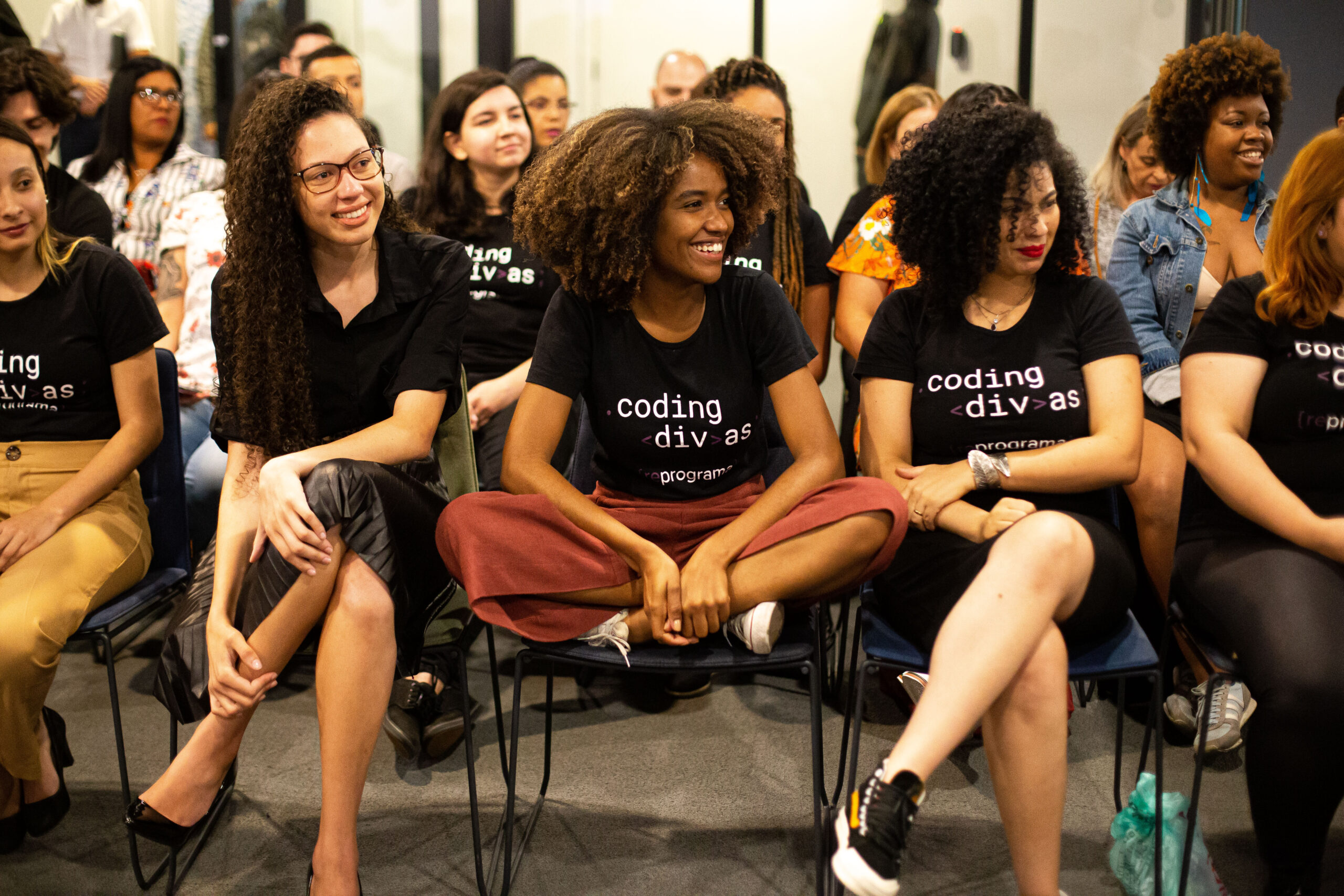Coding school for women seeks equity in the tech sector
With free courses and partnerships with companies, Reprograma inserts women in the job market.


Reprograma is a social impact initiative made by women for women. The school offers free and exclusive online programming courses. Then, through partnerships with companies, it places the students in the job market in the information technology sector.
Black, trans and transvestite students are priorities at the school. The objective is to enable women from vulnerable groups to be trained to work and remain in the sector. “Thus, we contribute to the construction of a diverse technology sector and, at the same time, we help these women to gain financial independence”, explains Nadja Brandão, executive director of Reprograma.
Of the 417 women trained between 2020 and 2021, around 300 were black women, and 42 were trans and transvestite women. Racial focus has always been a concern for Reprograma leaders, says Nadja. “Despite that, they didn’t know how to attract more black and non-white women to the courses. That’s why they decided to study black and Latin American feminism, in addition to hiring support consultants,” she recalls.
Programming for women
Appointed in 2022 to occupy the position of CEO of Reprograma, Nadja Brandão is a lawyer with a focus on Corporate Governance, Compliance and ESG, as well as leader in committees and programs focused on racial and gender inequality. She took charge of the organization in place of Mariel Reyes, creator of Reprograma.
The initiative started with a six-week front-end pilot class in São Paulo, in 2016. Front-end is the name given to the development of the visual part of a website or application, so that the user can interact with the program . As the course was a success, Mariel Reyes joined two other women, Carla De Bona and Fernanda Faria, to found a non-profit association. Thus, Reprograma was born.

Two years later, in 2018, they were invited to join Facebook’s Hack Station, now Meta, to work with technology education focusing on women. As a result, they were able to extend the front-end course from eight to 18 weeks. And they began to work actively on the employability of the students.
The following year, they implemented the first back-end class, to teach them how to work with the codes that allow the visual part to work correctly. The back-end courses provided greater chances of employability to the students, as it bridges the gap between the database and the browser’s information. The school also started the first class aimed at girls aged 14 to 17, in partnership with B3 social, Fundação Behring and XP Investimento.
Diversity, equity and inclusion
In 2022, Mariel Reyes left Reprograma to lead the philanthropic platform VélezReyes+. At this time, Nadja Brandão became the new CEO, intensifying the actions aimed at focusing on race, gender and income. “We strive to include more and more women from minority groups, from all regions of the country, of different races, ethnicities, sexual orientation, mothers and neurodiverse”, she says.
To ensure a welcoming environment, Reprograma instituted a committee responsible for diversity, equity and inclusion (DE&I) policies. The objective is to guarantee the application of these policies throughout the network, among students, staff and partnerships.
“Although we are moving towards achieving a better scenario regarding gender equality in the labor market, we still have a lot to do, especially when it comes to diversity, equity, inclusion and belonging”, says Nadja.
Free courses and partnerships with companies
All Reprograma courses are free, intensive and online. To offer the courses, the school has the support of donors, partner companies and volunteer work. Volunteers work in various activities, but the main one is technical monitoring, helping in the classroom or remotely, essential for those who have a few hours a day to dedicate to the course.
“Monitoring work involves everything from helping with specific doubts, correcting assignments and evaluating. We also receive volunteers who want to collaborate with us, but have no knowledge of programming languages, UX or education”, warns Nadja.


Partnerships with companies allow investments in the school and program growth. Companies can sponsor classes, share their professionals in mentoring processes and maintain a relationship channel for hiring women.
Companies can also contribute to the scholarship fund to finance low-income students. Scholarships last six months, the same period as a course, and cost R$1,300, thus guaranteeing quality access for students.
Digital Talent
According to Nadja Brandão, the Brazilian technology sector suffers from a lack of digital talent and the absence of women, especially the most vulnerable. These women face barriers to entering STEM fields, as Science, Technology, Engineering and Mathematics studies are called.
“Furthermore, the few women who decide to pursue careers in STEM often do not feel safe or welcome in these programs,” says Nadja Brandão. With that in mind, Reprograma developed the project “All in Tech” through a partnership with the Innovation Laboratory of the Inter-American Development Bank (BID Lab) and the support of five large companies: Accenture, Creditas, iFood, Meta and Nubank.
They also launched, in partnership with Mercado Livre, the “Conectadas” project, aimed at girls aged 14 to 18 in Latin America, focusing on health and wellness solutions, education, abandonment of animals and sex education. And they carried out the “Reprograma Teens”, a six-week online course, which initiates teenagers aged 14 to 17 in front-end programming.
As a result, Reprograma was one of the 34 non-governmental organizations selected by the Google.org Impact Challenge for Women and Girls in 2022. It was also recognized by Edict Prepara Futuro, a Santander initiative that supports social projects with the inclusion agenda production, that is, the insertion of people in a situation of economic vulnerability in the labor market.


Equity in the tech sector
“The society we live in is diverse, so it makes perfect sense that companies’ teams are diverse, in the technology sector and in any other area. If we only have one group represented creating solutions, we certainly won’t have a solution that serves everyone”, says Nadja Brandão.
The notion that women are not interested in exact sciences and technology has a social and cultural background. “Research shows that from the age of six, girls start to think that they are not good for STEM. And the mentality is created that computer and programming is just for boys. In addition, references of women in these areas are currently lacking. But it was not always so! Around 70% of Computer Science students at the University of São Paulo (IME – USP) were women until the 1970s. Today, they are only 15%”, she explains.
That is, formerly the area was occupied by women. “They were creators of several technologies and programming languages. However, soon after, some companies that made and sold computers, such as Apple, adopted boy-focused marketing strategies. This is believed to have discouraged girls from pursuing technology careers,” says Nadja.
She also cites the brogrammer culture, based on the stereotype of male, white, cis programmer, as an influence for women and girls to believe that programming is not for them. “Women need to believe in themselves. Mainly, that they learn to make mistakes, since they were taught to seek perfection, and understand that it is not an innate talent, but skills developed over time, with dedication and patience”, says Nadja Brandão about how to transform this culture.
Qualification, employment and labor market
Among the reasons for gender disparities in the technology sector is the lack of support and encouragement for women to study in STEM fields. “Most women’s achievements in the labor market are linked to their higher qualification level. Therefore, in addition to the determination to work in an area predominantly occupied by men, they need to invest in education so they can fly higher and higher”, warns Nadja.


Transforming this brogrammer culture, however, also needs to come from business leaders. According to a report by Forbes, women make up less than a third of tech workers, yet they are 65% more likely to lose their jobs than their male counterparts.
To facilitate the connection of trainees to the job market, Reprograma launched, in 2022, a hiring platform integrated with recruiters Guppy and GreenHouse. In addition to having access to the profiles of the students, when acquiring access to the platform, the company can also offer vacancies and carry out the selection process online from end to end. The value arising from the platform, it should be remembered, is reinvested in training women who cannot afford a course to become programmers.
Want to support this cause?
To donate, just click on the following link: Donate (paypal.com)
The link to be a volunteer is here
Follow the networks:
Instagram: www.instagram.com/reprogramabr
Twitter: www.twitter.com/reprogramabr
Linkedin: www.linkedin.com/company/reprogramabr/
Facebook: Reprograma | Facebook
*Notice to readers: Lupa do Bem’s production has focused on issues on women’s rights and empowerment throughout the month of March in celebration of International Women’s Day.



